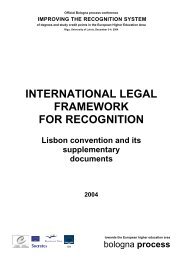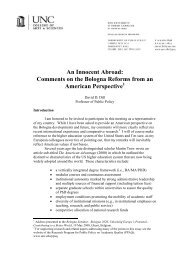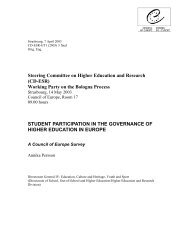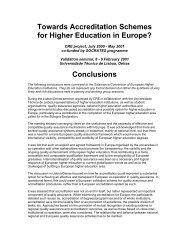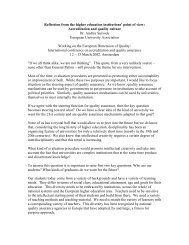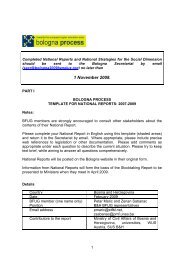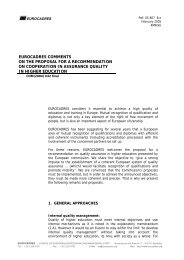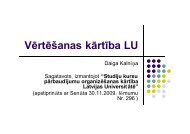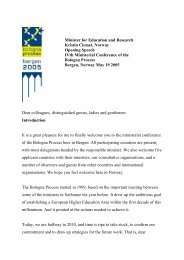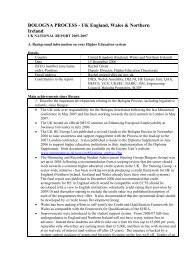EUA Survey Of Master Degrees In Europe - European University ...
EUA Survey Of Master Degrees In Europe - European University ...
EUA Survey Of Master Degrees In Europe - European University ...
You also want an ePaper? Increase the reach of your titles
YUMPU automatically turns print PDFs into web optimized ePapers that Google loves.
The fee-free <strong>Master</strong> may well become extinct. Wächter and Maiworm point to the emergence of aclear trend since 2002, when 57% of English-medium providers of <strong>Europe</strong>an Bachelors and <strong>Master</strong>s(outside Ireland and UK) charged no fee. By 2007, this figure had dropped to 30%, concentratedmainly in the Nordic countries. They regard this, to some extent, as the natural consequence of astronger background trend to the introduction of fees for all courses, whether delivered in Englishor not. <strong>In</strong>deed, Denmark has now introduced fees for non-EU students; Norway and Sweden arealmost bound to follow suit. A recent report by the Swedish National Agency for Higher Educationrevealed that, in some fee-free 2-year <strong>Master</strong> programmes, foreign students filled more than 95%of the places.The trend to fees therefore continues, even if wide variations in student purchasing power andacademic labour costs mean that full price convergence is a very long way off.The international market<strong>In</strong> none of the countries and institutions visited by <strong>EUA</strong> was there a headline strategic commitmentto the Chinese and <strong>In</strong>dian markets. Here, the UK currently enjoys <strong>Europe</strong>an market dominance, notmerely through high-profile in-country ventures, but also through routine recruitment of Chinesestudents in large numbers. English HEIs have been assisted, of course, by their proficiency in <strong>Europe</strong>’slingua franca. <strong>In</strong>jections of funding from two Prime Ministers’ <strong>In</strong>itiatives, the intermediation of theBritish Council, professional marketing departments operating at institutional level: these have allpowered concerted recruitment drives. UK HESA figures show that in 2007-08, non-EU full-timepostgraduate students in UK HEIs represented 41.75% of the total number of nearly a quarter of amillion students.Other countries have begun to follow the UK lead. Thanks to the DAAD office in Beijing, the Chinesemake up the largest group of foreign students in Germany. Campus France has five representationsin China and nine in <strong>In</strong>dia. Denmark has decided to intensify its marketing effort, independently ofthe other Nordic countries.The UK track record is a strong one, yet anxieties about its long-term competitiveness persist. Thesederive from the dominant 3+1 ECTS 270 model, which some feel may be perceived externally as‘Bologna-lite’, and from the evident high cost of the UK <strong>Master</strong> – to home and EU students, not tomention those from third countries who pay much more. Against that are set the UK’s claim to highquality standards, a strong student-centred ethos, continuing student demand and the fall in theinternational value of the pound sterling.The 2008 HEPI report cited earlier feared that the international Bachelor market would shrink, asdeveloping countries expanded their HE systems; it had more confidence in the buoyancy of secondcycle provision, but warned that ‘perceptions of aloofness from the Bologna process – howeverunfair – could damage UK universities in the long term’. By the time it had become clear that UKwas heading into recession, this anxiety had grown. Competition would become more intense andGermany, with its high level of subsidy to students, was felt to pose a strong threat.Drummond Bone, reporting to UK government, noted that ‘while the one year masters hastraditionally been competitive because of its short length and hence relatively low cost, the globalfeeling may be turning against it’. He concluded that ‘it will be necessary for the UK to remainflexible on masters’ length provision should global employers insist on a 2 year degree, but we mustnote that this would seriously disadvantage us in cost terms’.63



